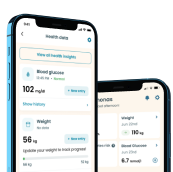Healthy Breakfasts: What to Eat and Why It Matters

You’ve probably heard the widely held belief that you ought to eat breakfast like a king, lunch like a prince, and dinner like a pauper. There’s a lot of truth to that! Breakfast plays a vital role in providing your body with the energy it needs to kick-start your day. While opinions vary on whether breakfast is essential, research shows that a nutritious breakfast can help you feel satisfied and energized. In contrast, skipping it may lead to low energy, irritability, and overeating later in the day.
Why Is It Important to Eat Breakfast?
Breakfast is often skipped due to busy mornings, lack of appetite, or dieting habits – but skipping it regularly can throw your day off balance. Without breakfast, your blood sugar levels may drop, leading to fatigue and stronger cravings throughout the day. This often results in overeating at lunch or dinner, especially choosing high-calorie, low-nutrient foods that offer quick energy but little long-term value.
Eating a well-rounded breakfast helps maintain energy levels, supports metabolism, and may even improve focus and mood. It’s also a great opportunity to add vital nutrients to your daily intake early on.
What Makes a Healthy Breakfast?
The best breakfast is one that aligns with your personal health goals – whether that’s managing weight, improving heart health, or simply maintaining energy throughout the day. There’s no one-size-fits-all answer, but there are a few universally beneficial guidelines:
DASH Diet:
Originally developed to manage high blood pressure, the DASH (Dietary Approaches to Stop Hypertension) diet is a balanced, nutritious eating pattern suitable for nearly everyone. It emphasizes whole foods and limits salt and unhealthy fats – making it great for overall wellness.
Key breakfast components in the DASH diet:
- Fruits and vegetables: Aim for at least half your plate. They’re rich in fiber, vitamins, and potassium, which supports heart health and reduces bloating.
- Nuts: Almonds, walnuts, hazelnuts, and pecans provide healthy fats that support brain and cardiovascular function. Just remember to enjoy them in moderation due to their calorie density.
- Calcium-rich foods: Low-fat yogurt, eggs, tofu, spinach, and dairy alternatives are essential for bone and vascular health.
- Low sodium: Try to limit your salt intake by avoiding processed foods and cooking with herbs and spices instead.
Here are a few DASH diet breakfast recipes to help you get started:
- Wild mushroom oatmeal with herbs: A savory twist featuring eggs, wild mushrooms, scallions, and rosemary.
- Grilled banana split fruit salad: With Greek yogurt, berries, pineapple chunks, almonds, and a drizzle of dark chocolate.
- Scrambled eggs with spinach, mushrooms, and feta: Add fresh tomatoes, bell peppers, or onions for more flavor and nutrition.
Keto Diet:
The keto diet focuses on minimizing carbohydrate intake and increasing healthy fats, pushing the body into a state of ketosis where fat becomes the primary energy source. While it’s more restrictive than other diets, many people find it effective for weight management and reducing cravings.
Keto-friendly breakfast basics:
- Keep carbs low: Ideally under 20g per meal.
- Protein-rich foods: Eggs, lean meats, and fish.
- Healthy fats: Avocados, olive oil, nuts, and seeds.
Sample keto breakfasts:
- Egg muffins with turkey bacon: Great for meal prep and packed with protein.
- Salmon and cream cheese wraps: Omega-3-rich and satisfying.
- Chocolate chia seed pudding with almond milk: Low in carbs, high in fiber, and easy to prepare ahead of time.
Mediterranean Diet
Praised for its heart-friendly benefits, the Mediterranean diet centers around fresh, seasonal produce, whole grains, olive oil, fish, and minimal red meat. It’s less about restriction and more about enjoying a wide variety of flavorful, wholesome ingredients.
Mediterranean breakfast principles:
- Cook with olive oil instead of butter or processed fats.
- Choose whole grains like barley or oats over refined ones.
- Use natural flavor enhancers such as garlic, lemon, and herbs.
Sample Mediterranean breakfasts:
- Maple granola with oats and nuts: Serve with yogurt and berries for a satisfying start.
- Apple cinnamon chia pudding: Simple, flavorful, and fiber-rich.
- Multigrain sandwich with eggs, veggies, and feta: A balanced and filling option perfect for busy mornings.
Breakfast Foods to Limit
While it’s tempting to indulge in sugary cereals, syrup-laden pancakes, and buttery pastries, these options often lead to energy crashes and may contribute to long-term health issues when eaten frequently.
Common less-healthy breakfast choices to reconsider:
- Pancakes or waffles made from refined flour and topped with syrup
- White toast with butter or sugary spreads
- Breakfast meats high in sodium like bacon or sausage
- Sugar-heavy coffee drinks and energy bars
Instead, try reimagining your favorites with more nutritious swaps – whole grain flours, natural sweeteners, plant-based spreads, and lower-sodium alternatives.
Good breakfast for healthy living
Whether you’re cooking at home or grabbing something on the go, starting your day with a balanced breakfast is one of the simplest ways to support your overall health. Focus on real, whole foods, listen to your body’s hunger signals, and choose meals that energize and nourish you.
Remember, healthy eating doesn’t mean giving up your favorite meals – it’s about upgrading them to serve your body better.
Take a quiz and get your diabetes-management plan today!









